 The Sweetener Debate: The Truth About Agave
The Sweetener Debate: The Truth About Agave
A spoonful of sugar may help the medicine go down, however the average American consumes about 150 pounds of sugar a year, and is thought to be responsible for the epidemic of obesity, diabetes and metabolic syndrome. Metabolic syndrome is a combination of 2 or more of the following: high blood pressure, high blood sugar, high triglycerides and increased waist to hip ratio (belly fat) and low HDL. Sugar is not so sweet when it comes to health effects. It can age you fast. Sugar intake is implicated weight gain, diabetes, high blood pressure, high cholesterol, premature aging, and heart disease. Sugar suppresses your immune system, causing problems with allergies and digestive disorders. It can even bring on depression. So what do you do with that sweet tooth?
People have turned to artificial sweeteners to satisfy their sweet tooth in an effort to avoid weight gain and blood sugar spikes. However, all but stevia have been shown to have negative health effects. Many people believe that Agave is safer. It’s been marketed as a natural, whole raw food sweetener. What about it?
Agave is processed.
Because it is processed at low temperatures, it is marketed as a raw food. Dr. Ingrid Kohlstadt, a fellow of the American College of Nutrition and an associate faculty member at Johns Hopkins School of Public Health commented, “Agave is almost all fructose, highly processed sugar with great marketing.” Fully chemically processed sap from the agave plant is known as hydrolyzed high fructose inulin syrup. Sound familiar? It doesn’t differ much from high fructose corn syrup except for its source. Fructose is a source of fuel that your liver converts to fat and cholesterol. Furthermore, it doesn’t affect insulin and leptin – hormones that regulate appetite. Therefore, it can contribute to overeating and weight gain. It is also not lower in calories. Although, agave syrup is about 16 calories per teaspoon, the same as table sugar.
Substantial differences in total antioxidant content of different sweeteners were found. Refined sugar, corn syrup, and agave nectar contained minimal antioxidant activity, maple syrup, brown sugar, and honey showed intermediate antioxidant capacity and raw cane sugar was slightly higher. Dark and blackstrap molasses had the highest antioxidant activity.
All Agave is not created equal.
It would be difficult for the average consumer to know how it is processed. The concentration of fructose in their agave, so it’s best to avoid it. If you must have something sweet, stick to raw, unprocessed honey, maple syrup or cane sugar in moderation.
Lorraine Maita, MD is an award winning physician, speaker and author of “Vibrance for Life: How to Live Younger and Healthier”. She is an expert in anti aging medicine, bioidentical hormone replacement, weight loss, nutrition, supplements and executive health. She has a private practice in Anti Aging Medicine howtoliveyounger.com in Short Hills, NJ. You can live younger and healthier; Click Here to Get my Best 7 Tips on How to Live Younger and Healthier!





She is a recognized and award-winning holistic, functional, integrative and anti-aging healthcare practitioner, speaker and author, and has been featured in ABC News, Forbes, WOR Radio and many media outlets to spread the word that you can live younger and healthier at any age.